Watching The Detectives
Cheryl Morgan looks at some current SF&F novels that have policemen and private eyes as central characters.
The relationship between speculative fiction and crime writing can be a very strange thing. Many spec-fic novels contain characters who are police or investigators of some sort, and our podcast this month features three authors who do very obvious crossovers. But just featuring such a character doesn’t make a book a crime novel, as I found out when I started reading a few this month.
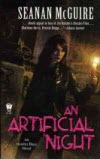
The most obvious example was Seanan McGuire’s An Artificial Light [Purchase]. This is the third volume in the October Daye series. The fourth, Late Eclipses [Purchase], has just been published, but I am a little behind in my reading. The central character, Toby, is supposed to be a private eye, as well as being a faery changeling. The first two books in the series did indeed conform to a crime novel structure. An Artificial Light begins with a crime — the kidnapping of some children — but the villain is identified very early. From then on the book morphs into a fantasy quest in which Toby must travel to one of the darker corners of Faerie and confront the bad guy to rescue the kids. There’s no actual detection in the story at all. The book is still a fun read, and occasionally heartrending, but it is not crime, no matter what some of the advertising might say.

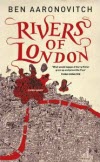
Ben Aaronovitch’s Rivers of London [Purchase] (inexplicably re-titled Midnight Riot for the American market) is much closer to the mark. The central character is an actual policeman, albeit that he also becomes a trainee wizard. A crime is committed, and it is solved, more or less, during the course of the book. However, it becomes clear very early on just who (or perhaps what) the bad guy is, and the story is really more about catching him and preventing him from killing more people, than it is about solving a crime.
I should also note that the book is a comedy. It isn’t full-on comedy like a Terry Pratchett book, but we are supposed to laugh at various things along the way, and I suspect that films like Simon Pegg’s Hot Fuzz may have had some influence on the creation of the book. There’s a good reason for that. It is, after all, quite difficult to imagine that the Metropolitan Police would have a secret department staffed by wizards, or indeed that the rest of the Met would do anything other than laugh at them.
Talking of laughing, this is very much British humor we have on our hands here. That means it is mainly laughing at people, particularly people who can be “othered” in some way. Once you realize who the bad guy is, this becomes somewhat excusable, because the comedy tradition that Aaronovitch is working in is based very much on laughing at cruelty to others. Even so, the comedy lesbian who is a hard dyke on the outside but a secret pink, sparkly pony lover on the inside is bound to irritate some. There’s also a brief and entirely gratuitous scene featuring what appears to be a transvestite character who is there solely to give the reader someone to laugh at.
Rivers of London is an entertaining book, especially if you have any fondness for London. It also makes a lot of use of the multi-cultural nature of the city’s current population. There will be people whose heads will explode at the thought of the spirits of London’s underground rivers being represented by Nigerian-British women. What you won’t find here, however, is much depth. There is a brief suggestion that the problems that afflict the city in the book are the result of chronic overcrowding, but that idea is not followed up. Compare this book to China Miéville’s Kraken, which is also a police comedy with wizards set in London, and it looks very thin indeed.

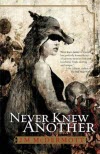
In complete contrast, J.M. McDermott’s new novel, Never Knew Another [Purchase], is not at all a comedy. There’s the occasional funny moment, but this is far more the sort of book that certain people have been characterizing as “nihilistic”. It is very grim in places, but well worth a read.
There is some police procedural material in it, in that the city guardsmen (known as King’s Men) in the book are very clearly based on American police-based TV shows. Sergeant Calipari is a very recognizable type. But he’s not the detective in the story, and the detectives are perhaps not the central characters. This is a much more complicated book than that. Let me explain.
The book opens with our two detectives hot on the scent of the bad guys. And I mean scent here, because these two are wolf shape-shifters whose noses are key to their investigative powers. They also have magical abilities. Rather like the detective in Colin Harvey’s Damage Time (see Salon Futura #3), they are able to access the memories of others. Of course they do so with magic, but the effect is the same. They are known as Walkers of Erin, which means they are priests of some sort, and their task in life is to hunt down demons.
Well, not full demons, but rather demon children, the half-demons hidden amongst us, people who are hated and shunned by all right-thinking folk. There are times when you think this may all be a metaphor for gays or some other ostracized group, but the demon children really are dangerous. Their bodily fluids are acidic and infectious; even accidental contact with them can cause people to sicken and die. When one is discovered, the contagion has to be burned out, even if that means destroying an entire city block.
The detection by memory reading allows McDermott to structure the book as a series of flashbacks into the lives of the hunted demon children. There are three of them, and we soon start to suspect that they really are as wicked as our werewolf priests say. The oldest, Salvatore, certainly has no redeeming qualities. Jona, Lord of Joni, is another matter. He’s a young nobleman fallen on hard times and forced to serve in the King’s Men to earn a living, keeping order amongst the slums built on land his family used to own. But he is short tempered, cruel, and given to violence. By day he is a police officer, by night (he has no need of sleep) he’s an enforcer for a city crime boss. We are rather glad that he starts the book dead.
Then there is Rachel. She, of all of our quarries, is the least human in appearance. She can also do magic. Her mystic’s robes are very useful in covering up her scaled and clawed body. Yet Rachel is, at heart, a good person. Indeed, she is one of the most likable characters in the whole book. Our detectives want to catch her and burn her, and we can’t help but hope that she escapes.
Never Knew Another is the first part of a trilogy, so inevitably much is left unexplained at the end of the book. There is, however, plenty to make me want to pick up the subsequent volumes. And even if the plot had been suspect, I would probably still want to do so because McDermott is one of the most interesting prose stylists working in fantasy today. I really like his writing.

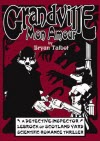
There’s another abrupt shift now as we move on to Bryan Talbot’s Grandville Mon Amour [Purchase]. I talked brief about this during the graphic story podcast (Salon Futura #5) and described it as “steampunk furries do Tarantino”. I stand by that. The characters are almost all talking animals. They live in a steampunk alternate Britain which, until the end of the previous book, had been part of the Napoleonic French empire. Our hero, Detective Inspector LeBrock, is a badger with an addiction to weight-lifting and an honorable streak wider than the English Channel. He’s also prone to the occasional whisky-fuelled bender. It is just as well he has his loyal assistant, Roderick Ratzi, to sort him out.
LeBrock does investigate crimes, but the stories thus far focus more on terrorism than on murder. There is also a definite stink of corruption in high places. Those of you who have read the first volume in the series, simply titled Grandville, may be disappointed to find a lot of similarity of plot between that book and the new one. Of course Talbot’s art is so magnificent that the books are worth buying just to look at. But what does it say about the world when one of our finest exponents of the art of the graphic novel has written two books, both of which feature the exposure of corrupt political leaders? Someone is very angry here, and he is not alone.

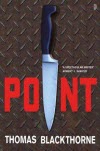
My final book this month is Point [Purchase] by Thomas Blackthorne. He, as many of you will know, is a pen name of science fiction writer John Meaney. The Blackthorne books are near-future political thrillers that allow Meaney to exploit his in-depth knowledge of martial arts and other combat sports. Point is the second in the series. I have not read Edge, but had little difficulty picking up on the setting and characters.
The books feature an ex-special forces soldier called Josh Cumberland who is a complex fellow prone to anger and violence. This is not a good thing, because he’s deadly. Right at the start of the book he almost kills someone by accident. I suspect this is Meaney making it very clear to people that being a one-person killing machine comes with a certain requirement for responsibility.
Josh isn’t a policeman himself, but he is something of a vigilante. In fact he reminds me a lot of Bruce Wayne at times, in his dedication to physical fitness and general anger at evildoers. He does, however, have a crime to solve, and it is a very nasty one that is killing lots of young people.
Meaney lives near the town of Brigend in South Wales. That won’t mean a lot to many of you, but some UK readers may remember a media panic from 2008 according to which there was supposed to be a plague of teen suicides in the town. Some very silly theories were advanced, one of which Ben Goldacre takes down in his inimitable style here. The Guardian has an interesting essay on the role of the media in the unfolding tragedy here.
Like any good writer, Meaney will use the real world in his fiction. In addition to it being local, this story must have been of interest to Meaney because he is something of an expert in mind control. He’s an accomplished hypnotist, and knows a fair amount about things like neuro-linguistic programming. He must have wondered whether there really was a method by which large numbers of teenagers could be induced to kill themselves, and if so, why would anyone do it?
This, then, is the crime that Josh Cumberland sets out to solve. But he does so against a background of a failing world beset by economic, ecological and political crises. A fundamentalist Christian has become President of the USA, and in the UK a cynical and ruthless Prime Minster is using every trick in the book to stay in power. Naturally he hires the best spin doctors in the world; people who know a bit about mind control.
Now that’s strange. We have two very different books: one full of steampunk and talking animals; the other near-future and full of knife fighters. Yet both books feature very fit, very angry men who discover that political corruption leads right to the top. McDermott’s book also hints at corruption in high places, and McGuire’s features a bad guy who is so far up the Faerie pecking order that he can get away with kidnapping and torturing children. You might be forgiven for thinking that there is a pattern here. Can it be that writers are reacting to current events and seeking to expose dishonest behavior by governments and media companies?
The Aaronovitch book is perhaps the inevitable exception, but it does seem that, when it comes down to it, speculative fiction is all about the real world.
If you enjoyed this article, please consider supporting Salon Futura financially, either by buying from the Wizard's Tower Bookstore, or by donating money directly via PayPal.